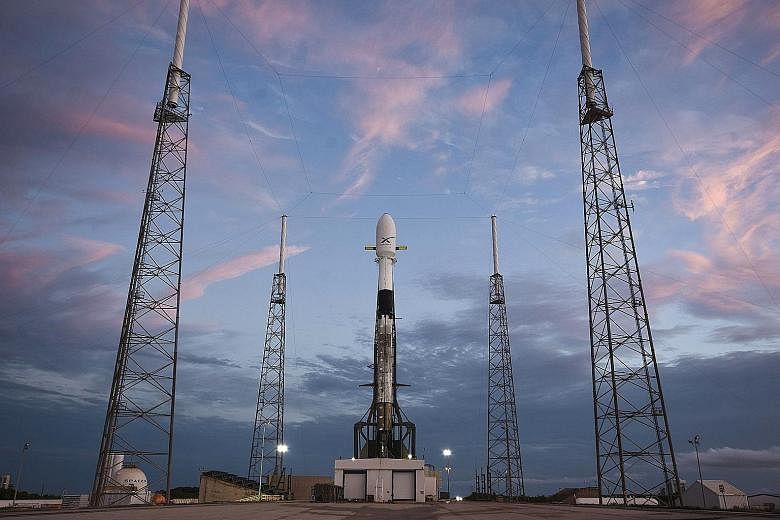CAPE CANAVERAL • Billionaire Elon Musk's SpaceX postponed a planned Wednesday night blast-off of a Falcon 9 rocket carrying the first 60 satellites for his new Starlink Internet service, citing excessive winds over the Florida launch site.
The launch of the mission, aimed at placing the initial stage of Mr Musk's space-based global Internet network into low-Earth orbit, was rescheduled for 10.30pm yesterday (10.30am Singapore time today) from the Cape Canaveral Air Force Station, SpaceX said.
In a call with reporters before Wednesday's countdown was halted, the high-tech entrepreneur praised the "fundamental goodness" of his ambitions to expand Internet connectivity globally but cautioned that success was far from guaranteed.
Mr Musk said he expects revenues from rocket launch services provided by his privately held Space Exploration Technologies, known as SpaceX, to top out at about US$3 billion (S$4.1 billion) per year.
That makes Starlink key to generating the cash that SpaceX needs to fund Mr Musk's larger dream of developing new spacecraft capable of flying paying customers to the Moon and eventually trying to colonise Mars.
"We think this is a key stepping stone on the way towards establishing a self-sustaining city on Mars and a base on the Moon," said Mr Musk, who is also the chief executive officer of carmaker Tesla.
Each satellite in the first Starlink launch weighs 227kg, making this the heaviest SpaceX payload to date.
It will take at least 12 launches of additional satellites to achieve Mr Musk's goal of providing constant Internet coverage for most of the world, he said. Starlink is authorised only for operations in the United States.
Mr Musk faces stiff competition. In February, Airbus-backed OneWeb launched its own clutch of satellites, while LeoSat Enterprises and Canada's Telesat are also working to build data networks.
All consist of tiny satellites that orbit closer to Earth than traditional communications satellites, a radical shift made possible by leaps in laser technology and computer chips.
Mr Musk has faced other challenges. Frustrated with the pace at which Starlink satellites were being developed, he fired at least seven members of the programme's senior management team at a campus in Redmond, Washington, outside Seattle.
Mr Musk said SpaceX has "sufficient capital" to make Starlink operational but would potentially need to raise money if things go wrong with the multibillion-dollar endeavour, which he called "one of the hardest engineering projects I've ever seen done".
REUTERS

